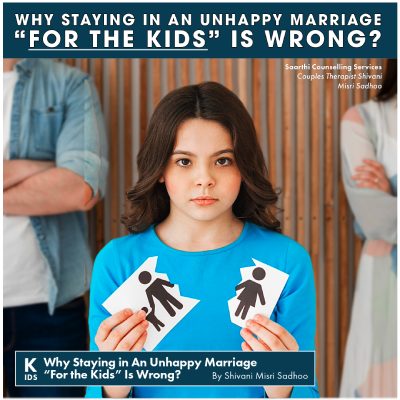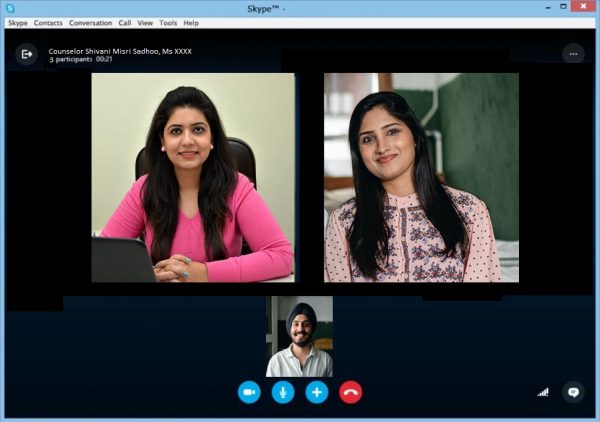Marriages are often celebrated as the union of two souls destined for eternal happiness. However, the reality is that not all marriages are made in heaven. The question of whether to endure an unhappy marriage “for the kids” is a complex dilemma.
When faced with the prospect of divorce, the decision becomes particularly challenging when children are involved. Should one persist in a toxic and joyless marriage for the sake of the children, or should they contemplate ending it?

Why continuing with an unhappy marriage is harmful for your children?
Leading marriage counsellor Shivani Misri Sadhoo explains the following factors in the article further. These are:
1. Psychological Stress
An unhappy marriage is often fraught with tension, resentment, and conflict. Children are highly perceptive and can sense this negative atmosphere. Constant exposure to such stress can lead to emotional and psychological distress in children, affecting their overall well-being and development.
Kids are sensitive to their parents’ feelings, and when parents are unhappy, children may feel it’s their fault or experience anxiety, depression, or low self-esteem. These emotional scars can last a long time.
2. Builds Negative Perception
Children learn about relationships primarily through observing their parents’ interactions. In the context of an unhappy marriage, prolonged exposure can normalize dysfunctional dynamics for them. Consequently, their understanding of a healthy partnership becomes skewed, potentially leading to troubled future relationships.
An environment marked by emotional distance and hostility between parents hampers the development of vital emotional skills and communication patterns in children. Such situations breed unresolved conflicts and negatively impact a child’s perception of acceptable relationship norms, perpetuating cycles of unhappiness in their own future partnerships.
3. Delayed Divorce Does More Harm than Good
Remaining in an unhappy marriage until your children become independent may seem like a way to shield them from the upheaval of divorce or separation. However, this approach doesn’t always reduce their stress.
If your children have never experienced extended periods away from you, leaving home, particularly when they move to a new city for further education, can be highly distressing. The added burden of a divorce, coupled with new responsibilities, could potentially disrupt their studies and transition into adulthood.
4. Self-Sacrifice Can Be Dissatisfying
Sacrificing your own happiness for the sake of your kids may seem noble, but it can have negative consequences. Unhappy parents may struggle to provide a stable and nurturing environment. True parental sacrifice means making choices that benefit both parents and children.
You don’t have to be a martyr; divorce can be a self-improvement decision if you still attend to your children’s needs. Happier people are better at everything, including being better parents, which is a great gift for your kids and yourself.
5. Causes Relationship Breakdowns
Prolonged unhappiness within a marriage can gradually foster resentment and bitterness, which may ultimately seep into various aspects of one’s life, affecting relationships with friends and family. Children raised in such an environment may lack positive examples of loving relationships.
Stress and tension can inadvertently strain the parent-child relationship, causing resentment and strained connections, leaving children questioning the authenticity of their upbringing.
6. Disrupts Communication
An unsatisfactory marriage can lead to a communication breakdown between parents, complicating the establishment of fair child arrangements. Resolving issues as they arise is crucial for facilitating decisions in the children’s best interests. Redirecting efforts from a troubled marriage toward fostering a positive co-parenting relationship is essential.
In unhappy marriages, couples often struggle with effective communication, which can negatively influence their children’s ability to express feelings and thoughts, potentially impacting their future relationships and friendships. Teaching kids healthy communication and conflict resolution within a family setting is vital for enhancing their future relationships.
What did we learn?
Staying in an unhappy marriage can harm children by subjecting them to psychological stress, distorting their perception of healthy relationships, and potentially causing long-term emotional scars. Delaying divorce may not always protect them, and self-sacrifice may lead to an unsatisfactory family environment. Effective communication and prioritizing well-being can be key to mitigating these negative effects on children.


